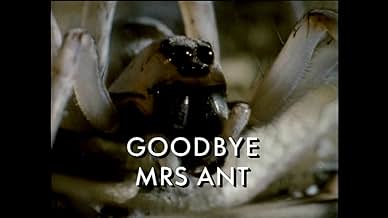Agrega una trama en tu idiomaThe consequences of exploiting technological and political ideas without understanding and concern for the outcome.The consequences of exploiting technological and political ideas without understanding and concern for the outcome.The consequences of exploiting technological and political ideas without understanding and concern for the outcome.
- Ganó 1 premio BAFTA
- 1 premio ganado en total
Explorar episodios
Argumento
¿Sabías que…?
- Bandas sonorasTime, Forward
Written by Georgi Sviridov
Opinión destacada
Once upon a time, science offered up solutions on a myriad of levels. Planned economies, vast industrialization, limitless nuclear power, all these, and more, were the great dreams of the 20th century. By century's end, however, they had become nightmares and traps. How they became that way is the subject of Adam Curtis' Pandora's Box, a six-part series that aired on BBC Two nearly thirty years ago and which hasn't lost any of its power.
Across those six episodes, it offers up, to paraphrase the series' subtitle, "fables from the age of science." It starts with the Soviet Union and how the grand notions of 'social engineering' and how industrializing Russia would create a 'rational society' instead led to quotas, stagnation, and the ultimate collapse of the system under its own weight. As Curtis puts it, "What had begun as a grand moral attempt to build a rational society ended by creating a bizarre, bewildering existence for millions of Soviet people."
Curtis moves across the Cold War divide for the middle third of the series, focusing on America and the UK. The second episode takes on the reliance upon game theory and systems analysis inside the Pentagon and its associated think tanks, and its effect upon US defense policy. It leads to some startling moments of archival footage with members of said think tanks insisting that a limited nuclear war was not only possible but a welcome possibility. All before culminating in the science fiction dreams of Reagan's Star Wars program.
Episode three, meanwhile, shifts to the UK and the attempts across thirty years and successive British governments to use different economists to plan and reach targeted economic growth. From MacMillan and Wilson to Thatcher, it's a remarkable journey through efforts to turn economic theory into reality. Efforts that, as Alan Budd observes at the episode's conclusion, likely did far more harm than good. Not to mention creating surreal moments where Curtis demonstrates Thatcher praising Monetarism in one clip before claiming to have never subscribed to it just a few minutes (or a rather a few years) later.
Governments weren't alone in twisting science to their own ends. Episode four, Goodbye Mrs. Ant, looks at the widespread use of DDT in the US from the 1940s to the 1960s. It explores how the miracle chemical that saved lives in the Pacific Theater of World War II became a multi-million dollar industry, despite warnings that soon appeared, and how it co-opted entomology in the process. The fight to reveals its dangers gets considerable focus, as does how that fight helped give rise to the modern environmental movement, allowing politics and business pressures to transform the science of ecology.
Africa becomes the focus of episode five. In the 1950s, Ghana's Kwame Nkrumah dreamed of turning his country into the new industrial heart of a post-colonial continent. To do it, Nkrumah and the nation required the building of the Volta River dam. The dream of using science to change an entire country, however, soon turned into a nightmare of government corruption and the politics of the Cold War, culminating in a CIA backed coup. Nearly thirty years after the dam's construction was complete, the only people who seemed to have benefitted from it was the American corporation that helped finance its building.
The final installment looks at the development of nuclear power plants in the US, UK, and inside the Soviet Union. What started as an energy panacea, sold to the public through information films such as the episode's namesake A is for Atom, seemed to offer a more benevolent side to the nuclear age. Instead, thanks to economic factors and the reluctance of both government and those inside the industry to admit to faults for fear of utterly destroying it, dozens of potentially unsafe nuclear reactors found themselves populating the countryside of these three countries. The accidents at Three Mile Island and Chernobyl were to demonstrate, this conflict between science and economics was to have disastrous results.
Across all six episodes, Curtis finds ways of presenting these intriguing tales of science and politics gone wrong. There are the expected interviews with figures involved in each, including surreal scenes of Soviet planners holding up a long computer print out regarding the expected demand for pantyhose and of entomologist Gordon Edwards eating from a carton of DDT to demonstrate how harmless it is. Curtis all draws on a wealth of archival material, from the BBC archives and others, to illustrate the dreams that were and the nightmares they became. It's an incredible combination, offering juxtapositions that are sometimes humorous, sometimes horrifying, but always informative.
If nothing else, Pandora's Box lives up to its subtitle. These are tales of science and technology offer panaceas to issues of war, peace, and economy. In the end, however, they often run foul of human concerns, unpredictable if not petty at times. Perhaps, in the end, the fault lies not with these would-be cures but with those administering them, unleashing forces they wish to harness but ultimately discover they are nigh helpless to stop.
Not unlike Pandora and her mythical box, after all.
Across those six episodes, it offers up, to paraphrase the series' subtitle, "fables from the age of science." It starts with the Soviet Union and how the grand notions of 'social engineering' and how industrializing Russia would create a 'rational society' instead led to quotas, stagnation, and the ultimate collapse of the system under its own weight. As Curtis puts it, "What had begun as a grand moral attempt to build a rational society ended by creating a bizarre, bewildering existence for millions of Soviet people."
Curtis moves across the Cold War divide for the middle third of the series, focusing on America and the UK. The second episode takes on the reliance upon game theory and systems analysis inside the Pentagon and its associated think tanks, and its effect upon US defense policy. It leads to some startling moments of archival footage with members of said think tanks insisting that a limited nuclear war was not only possible but a welcome possibility. All before culminating in the science fiction dreams of Reagan's Star Wars program.
Episode three, meanwhile, shifts to the UK and the attempts across thirty years and successive British governments to use different economists to plan and reach targeted economic growth. From MacMillan and Wilson to Thatcher, it's a remarkable journey through efforts to turn economic theory into reality. Efforts that, as Alan Budd observes at the episode's conclusion, likely did far more harm than good. Not to mention creating surreal moments where Curtis demonstrates Thatcher praising Monetarism in one clip before claiming to have never subscribed to it just a few minutes (or a rather a few years) later.
Governments weren't alone in twisting science to their own ends. Episode four, Goodbye Mrs. Ant, looks at the widespread use of DDT in the US from the 1940s to the 1960s. It explores how the miracle chemical that saved lives in the Pacific Theater of World War II became a multi-million dollar industry, despite warnings that soon appeared, and how it co-opted entomology in the process. The fight to reveals its dangers gets considerable focus, as does how that fight helped give rise to the modern environmental movement, allowing politics and business pressures to transform the science of ecology.
Africa becomes the focus of episode five. In the 1950s, Ghana's Kwame Nkrumah dreamed of turning his country into the new industrial heart of a post-colonial continent. To do it, Nkrumah and the nation required the building of the Volta River dam. The dream of using science to change an entire country, however, soon turned into a nightmare of government corruption and the politics of the Cold War, culminating in a CIA backed coup. Nearly thirty years after the dam's construction was complete, the only people who seemed to have benefitted from it was the American corporation that helped finance its building.
The final installment looks at the development of nuclear power plants in the US, UK, and inside the Soviet Union. What started as an energy panacea, sold to the public through information films such as the episode's namesake A is for Atom, seemed to offer a more benevolent side to the nuclear age. Instead, thanks to economic factors and the reluctance of both government and those inside the industry to admit to faults for fear of utterly destroying it, dozens of potentially unsafe nuclear reactors found themselves populating the countryside of these three countries. The accidents at Three Mile Island and Chernobyl were to demonstrate, this conflict between science and economics was to have disastrous results.
Across all six episodes, Curtis finds ways of presenting these intriguing tales of science and politics gone wrong. There are the expected interviews with figures involved in each, including surreal scenes of Soviet planners holding up a long computer print out regarding the expected demand for pantyhose and of entomologist Gordon Edwards eating from a carton of DDT to demonstrate how harmless it is. Curtis all draws on a wealth of archival material, from the BBC archives and others, to illustrate the dreams that were and the nightmares they became. It's an incredible combination, offering juxtapositions that are sometimes humorous, sometimes horrifying, but always informative.
If nothing else, Pandora's Box lives up to its subtitle. These are tales of science and technology offer panaceas to issues of war, peace, and economy. In the end, however, they often run foul of human concerns, unpredictable if not petty at times. Perhaps, in the end, the fault lies not with these would-be cures but with those administering them, unleashing forces they wish to harness but ultimately discover they are nigh helpless to stop.
Not unlike Pandora and her mythical box, after all.
- timdalton007
- 27 mar 2020
- Enlace permanente
Selecciones populares
Inicia sesión para calificar y agrega a la lista de videos para obtener recomendaciones personalizadas
Detalles
- Tiempo de ejecución4 horas 36 minutos
- Color
Contribuir a esta página
Sugiere una edición o agrega el contenido que falta

Principales brechas de datos
By what name was Pandora's Box (1992) officially released in Canada in English?
Responda



















